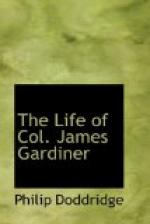[Note: See “Revivals in Scotland,” published by the Board of Publication.]
It was with great pleasure that he received any intelligence of a like kind from England, whether the clergy of the Established Church or dissenting ministers, whether our own countrymen or foreigners, were the instruments of it. Whatever weaknesses or errors might mingle themselves with valuable qualities in such as were active in such a work, he appeared to love and honour them in proportion to the degree he saw reason to believe that their hearts were devoted to the service of Christ, and their attempts owned and succeeded by him. I remember, that mentioning one of these gentlemen who had been remarkably successful in his ministry, and who seemed to have met with some very unkind usage, he says, “I had rather be that despised, persecuted man, to be an instrument in the hand of the Spirit in converting so many souls, and building up so many in their holy faith, than I would be emperor of the whole world.” Yet this steady and judicious Christian, (for such he most assuredly was,) at the same time that he esteemed a man for his good intentions, and his worthy qualities, did not suffer himself to be hurried away into all the singularity of his sentiments, or to admire his imprudences or excesses. On the contrary, he saw and lamented that artifice which the great father of fraud has so long and so successfully been practising, and who, like the enemies of Israel, when he cannot entirely prevent the building of God’s temple, does, as it were, offer his assistance to carry on the work, that he may thereby get the most effectual opportunities of obstructing it. The colonel often expressed his astonishment at the wide extremes into which some whom on the whole he thought very worthy men, were permitted to run in many doctrinal and speculative




